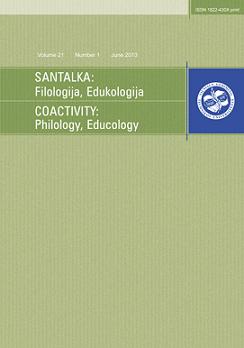Technologijų Mokytojų Kompetencijos, Kintant Ugdymo Paradigmai
Competences Of Technology Teachers Within Education Paradigm Change
Author(s): Nijolė Bankauskienė, Ramunė Masaitytė-ApuokienėSubject(s): Language and Literature Studies
Published by: Vilnius Gediminas Technical University
Keywords: competence; qualification; teaching or influence; interaction and learning paradigms; roles of technology teachers; competences of a technology teacher; method of action research.
Summary/Abstract: In the 21st century, when technologies change and the knowledge society develops, the requirements for the activity of profession teachers have increased. It is particularly because that the change of education paradigms from teaching and impact paradigms towards learning paradigm. Teacher’s roles change, new functions in the activity technologies’ teachers emerge. The aim of the article – is to find out in what competences a teacher of technologies should distinguish when education paradigm changes. The article consists of three parts. The first part discusses three education paradigms and their peculiarities by stressing the activity of a teacher and pupil. The second part distinguishes the competences characteristic for a teacher of technologies in the context of long-life and sustainable development education by considering the Competencies of European Qualification Structure and the Inventory of Teacher’s Profession Competences (2007). The third part presents the results of the empirical research: the final projects of six teachers-students (respondents), who in 2011 graduated from the non-degree study programme ‘Pedagogy’ at the Department of Educational Systems, Faculty of Social Sciences, Kaunas University of Technology, were analysed. These teachers already possessing the diploma of the bachelor in technologies wanted to acquire the certificate of technology teacher’s qualification. Beside theoretical study subjects the teachers–students, when studying at one-year programme, prepared and defended their final and qualification project by applying action research in order to get the certificate of a technology teacher. In the project they presented the inventory of acquired and developed competences as well as analysed their pedagogical activity. The research results showed what competences the teachers-students who graduated from the study programme ‘Pedagogy’ possess and what competences they lack. Referring to peculiarities of paradigms, it was identified in what teaching, interaction or learning paradigm future technology teachers worked and performed action research.
Journal: Santalka: Filologija, Edukologija
- Issue Year: 20/2012
- Issue No: 2
- Page Range: 141-153
- Page Count: 13
- Language: Lithuanian

